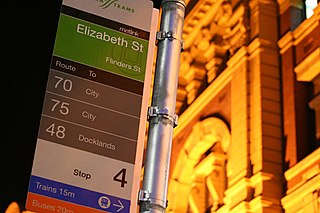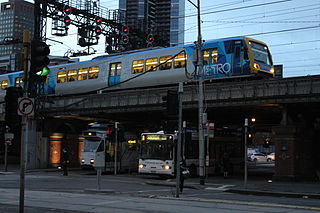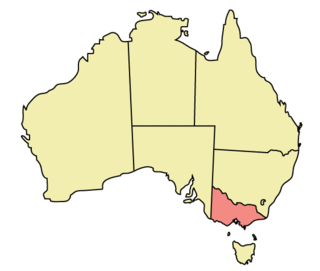
Metlink was the marketing body and umbrella brand for public train, tram and bus transport operators in Melbourne, Australia. On 2 April 2012, the operations of Metlink were transferred to the newly created public transport planning and management authority, Public Transport Victoria.

Transport in Melbourne, the state capital of Victoria, Australia, consists of several interlinking modes. Melbourne is a hub for intercity, intracity and regional travel. Road-based transport accounts for most trips across many parts of the city, facilitated by Australia's largest freeway network. Public transport, including the world's largest tram network, trains and buses, also forms a key part of the transport system. Other dominant modes include walking, cycling and commercial-passenger vehicle services such as taxis.
The Cabcharge account payment system was established in 1976 to provide taxi passengers a way to pay for taxi fares by non-cash means. The payment system is owned and operated by A2B Australia, an Australian Securities Exchange listed public company. In the UK and Singapore, Cabcharge is operated by subsidiaries of ComfortDelGro.

Taxis in Australia are highly regulated by each Australian state and territory, with each state and territory having its own history and structure. In December 2014, there were 21,344 taxis in Australia. Taxis in Australia are required to be licensed and are typically required to operate and charge on a fitted taximeter. Taxi fare rates are set by State or Territory governments. A vehicle without a meter is generally not considered to be a taxi, and may be described, for example, as a hire car, limousine, carpool, etc. Most taxis today are fueled by liquid petroleum gas. A2B Australia owns and operates the Cabcharge payment system, which covers 98% of taxis in Australia, and operates one of Australia's largest taxi networks.
Transport law is the area of law dealing with transport. The laws can apply very broadly at a transport system level or more narrowly to transport things or activities within that system such as vehicles, things and behaviours. Transport law is generally found in two main areas:

The Transport Integration Act 2010 is a law enacted by the Parliament of the State of Victoria, Australia. The Act is the prime transport statute in Victoria, having replaced major parts of the Transport Act 1983, which was renamed as the Transport Act 1983.

The Transport Legislation Review is a policy and legislation review project conducted by the Department of Transport in the State of Victoria, Australia between 2004 and late 2010. The aim of the project was review of transport policy and laws and generation of new policy and legislation as a platform for better transport across the State.

The Department of Transport (DOT) was the government agency responsible for the coordination, integration and regulation of the transport system in the State of Victoria, Australia. The department generated planning, policy, and legislation for transport in Victoria. As a result, the department drove the integration of Victoria's transport land and water transport systems and the delivery of public transport, road and port services and associated activities across the State. The department's stated mission was "Building a safer, fairer and greener transport system for all Victorians to create a more prosperous and connected community."

The Rail Safety Act 2006 is a law enacted by the Parliament of the State of Victoria, Australia, and is the prime statute regulating the safety of rail operations in Victoria. The Act was developed as part of the Transport Legislation Review conducted by the Department of Transport between 2004 and 2010 and is aimed at preventing deaths and injuries arising from rail operations.

The Director of Public Transport was the head of the Public Transport Division (PTD) of the Victorian Department of Transport. PTD was the government agency responsible for promoting, providing, coordinating and regulating public transport in the state of Victoria, Australia between August 1999 and June 2013. The Director of Public Transport was created as a statutory office supported by staff of the Department of Transport.
The Director, Transport Safety, who operates as Transport Safety Victoria, is the independent Government agency responsible for bus and marine safety in the State of Victoria, Australia. The position was created as a statutory office by the Transport Integration Act 2010 and the office commenced operation on 1 July 2010. The Rail branch of TSV completed transfer to the Office of the National Rail Safety Regulator (ONRSR) in December 2019.
The Director, Public Transport Safety was the independent Government agency responsible for rail and bus safety in the State of Victoria, Australia, between 1 August 2006 and 30 June 2010. The position was created as a statutory office by statute in early 2006 and was the State's first independent public transport safety position. The office was superseded by the position of the Director, Transport Safety which commenced operation on 1 July 2010. The former Safety Director, Public Transport Safety, Alan Osborne, was directly appointed to the new office.
The Chief Investigator, Transport Safety is the independent Government agency responsible for investigation of safety-related trends and incidents in the rail, bus and marine industries in the State of Victoria, Australia.

The Accident Towing Services Act 2007 is a law enacted by the Parliament of the State of Victoria, Australia. The act is the prime statute regulating the vehicle towing industry which provides towing and recovery services for light and heavy road vehicles across Victoria. It is predominately founded on safety and consumer protection sentiments. The act continued economic controls over the industry and contains occupational regulation characteristics. The style of the underlying regulatory scheme varies in parts and represents a blend which is prescriptive in some parts and performance and process-based in others.

The Bus Safety Act 2009 is a law enacted by the Parliament of the State of Victoria, Australia and is the prime statute regulating the safety of bus operations in Victoria. The Act was developed as part of the Transport Legislation Review conducted by the Department of Transport between 2004 and 2010 and is aimed at preventing deaths and injuries arising from bus operations in Victoria and establishes a modern "best practice" regulatory framework to assist in maintaining and improving the Victorian bus industry's good safety record.

The Taxi Industry Inquiry or the Fels Inquiry was an inquiry commissioned in 2011 into the taxi industry and taxi services in Victoria, Australia, by the Taxi Services Commission. The inquiry was headed by Professor Allan Fels assisted by Dr David Cousins.
The Transport Legislation Amendment Act 2011 is a law enacted by the Parliament of the State of Victoria, Australia to reform taxi and other small commercial passenger vehicle services in the State.
The Transport Act 1983 was the main statute establishing government transport organisations and regulating land transport activities in the State of Victoria, Australia for 27 years from mid-1983 to mid-2010. The act was used as the vehicle for changes to transport organisational arrangements and transport regulation activities pursued by Victorian governments over that period.

The Transport Act 1983 is a prime statute regulating transport activities in the State of Victoria, Australia. Key areas regulated by the statute currently include taxi and hire car services and compliance and enforcement, particularly in areas like safety and public transport ticketing and conduct.
The Transport Matters Party was an Australian political party active in Victoria. The party was registered with the Victorian Electoral Commission on 30 April 2018, after an application was received by the VEC on 9 January 2018.









